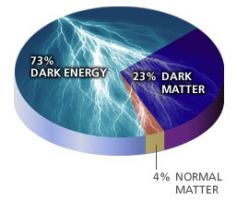
image: jaycross
The good news is, it's foundational either way.
In one version, a whopping 4% of the energy density of the universe is baryonic. Another way to say this, of course, is almost everything that exists is completely unknown to us--and since it doesn't interact, quite possibly unknowable (in a direct sense). The entirety of physical science up to the 1970's, that is to say, has been concerned with a slim skein of matter and radiation, that tiny fraction that constitutes every star, every galaxy, indeed every cosmologist that ever was. Not only aren't we the stuff of which the universe is made, neither is anything else.
As with superstrings, the popular press has made Dark Matter and Dark Energy commonplace enough ideas that the mention of them raises fewer and fewer hackles. But if we take a step back, it's still a *prima facie* fantastic suggestion. All matter we know of is an outlier, a little fluff on the cosmic cusp? Almost everything . . . is something else?
How did we come by this strange hypothesis? Essentially, galaxies don't rotate the way they should. (There are other lines of evidence--gravitational lensing, for example--and a strong case can be made that they simply settle the issue. Check out the impassioned discussion of the Bullet Cluster over at Cosmic Variance.) But the biggie is that the rotational speeds of galaxies and the orbital velocities of galactic clusters don't match predictions. The farther-out parts turn too much too fast, implying that there's a lot more mass there that we can't see.
Which sounds reasonable until you do the calculations, and find that to match observation, it must be more than 90% of the galactic mass that is this strangely non-radiating, non-reflecting stuff. Which is another way of saying almost the whole thing is mysterious. The actual galaxy itself is almost irrelevant to this titanic, invisible something we are now defining as "galaxy."

Maybe so. But my concern is that we may be losing sight (ha ha) of just how strange a claim this is. Isn't it more likely that, if your best model tells you galaxies should do X and observation shows them doing Y, that your best model is incorrect at galactic scales - not that we have no idea what galaxies actually are?
I know, I know, we can't mess around with gravity. Jockeying with that is too . . . well, foundational. It would take an Einstein to question the fundamentals rather than play out the accepted model, no matter how unpalatable its implications.
And I admit, the Dark Matter interpretation is probably right; it is probably absolutely right. WIMPs and MACHOs and what have you. But just to play devil's advocate--and to invite some discussion--is the notion that GR doesn't apply over an unlimited range (Pioneer Anomaly, anyone?) really any more radical than suggesting that the overwhelming majority of what exists . . . 96% of everything . . . has never even been glimpsed . . . ?

image: woodleywonderworks